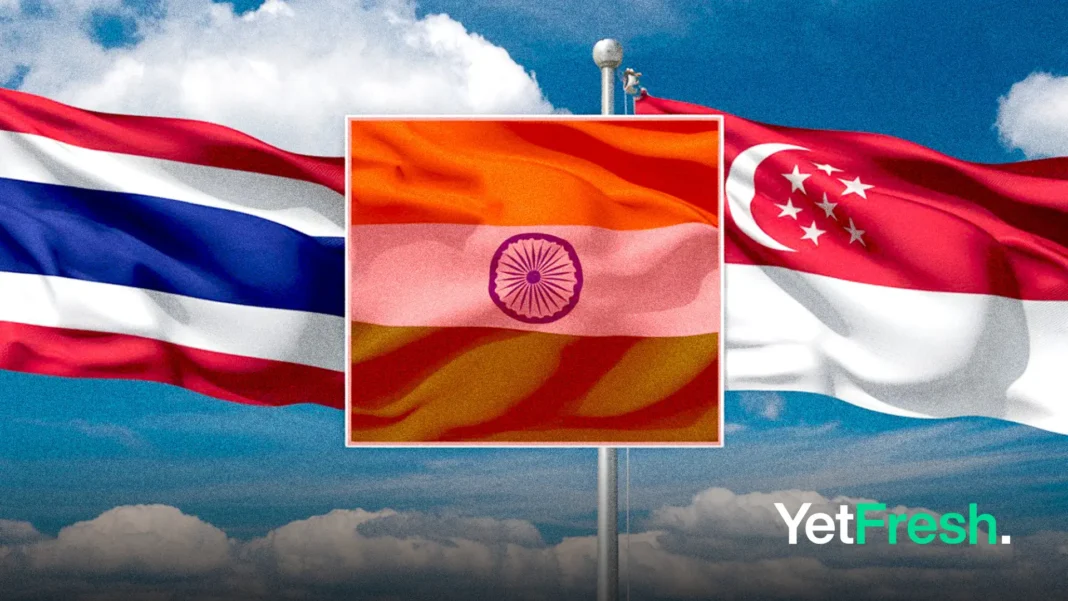Summary:
- Bangladeshi credit card spending in India dropped over 40% year-on-year in October 2024, driven by strict visa restrictions limiting travel for medical and tourism purposes.
- Thailand has overtaken India as the second-largest destination for Bangladeshi credit card spending, with usage rising from Tk 42 crore in September to Tk 57 crore in October.
- Singapore also saw a sharp increase in Bangladeshi credit card spending, reaching Tk 43 crore in October, up from Tk 30 crore in September.
- Domestic and international credit card transactions by Bangladeshis increased overall, reflecting broader shifts in travel and consumer behavior.
Bangladeshi credit card spending abroad has undergone a significant shift, with a marked decline in India and a rise in destinations like Thailand and Singapore. This trend, as revealed by the latest Bangladesh Bank data, reflects changing travel patterns influenced by geopolitical developments, particularly India’s restrictive visa policies.
In October 2024, Bangladeshi credit card spending in India dropped by over 40% year-over-year, falling to Tk 53.8 crore from Tk 90.2 crore in October 2023. India’s share of total overseas credit card expenditure by Bangladeshis also declined sharply, from 16.5% to 10.78% during the same period. Historically the top destination for Bangladeshi credit card usage abroad, India has now been overtaken by Thailand and Singapore as preferred destinations.
The decline in spending in India is closely tied to visa restrictions imposed after political unrest in Bangladesh earlier this year. Following the ousting of Prime Minister Sheikh Hasina in August 2024, India limited visa issuance to emergency and medical cases only. Indian High Commissioner Pranay Verma confirmed in October that tourist visas for Bangladeshis would not resume soon, citing the prevailing instability. This has significantly reduced the flow of Bangladeshi patients and tourists to India, traditionally a major destination for medical treatment and leisure travel.
As a result, Bangladeshi travelers are increasingly turning to alternative destinations like Thailand and Singapore. In October, credit card spending by Bangladeshis in Thailand surged to Tk 57 crore from Tk 42 crore in September, making it the second-largest destination for such expenditures. Similarly, spending in Singapore rose from Tk 30 crore to Tk 43 crore over the same period.
Syed Mohammad Kamal, country manager for Bangladesh at Mastercard, noted that visits to India have dropped by nearly 90% due to the visa restrictions. He explained that many Bangladeshi tourists who previously frequented Indian cities like Kolkata or Mumbai are now opting for destinations such as Cox’s Bazar within Bangladesh or traveling abroad to Thailand, Singapore, and Nepal.
The broader data on credit card usage underscores these shifting trends. According to the Bangladesh Bank report titled “An Overview of Credit Cards Usage Pattern Within and Outside Bangladesh,” international transactions by Bangladeshi credit cardholders totaled Tk 498 crore in October, an 18.56% increase from Tk 420 crore in September. Domestically, credit card transactions also rose by 7.41%, reaching Tk 28.66 crore.
This shift away from India has broader implications for bilateral relations and economic activities between the two nations. The reduction in Bangladeshi visitors has impacted Indian cities heavily reliant on tourism revenue from their neighbors. Meanwhile, the growing preference for Southeast Asian destinations highlights evolving consumer behavior amid changing geopolitical dynamics.
The United States remains the leading destination for Bangladeshi credit card spending abroad, with Thailand now taking second place and India falling to third. As geopolitical factors continue to influence travel patterns, these trends underscore how external policies can reshape consumer behavior on an international scale.
Source: The Daily Star




